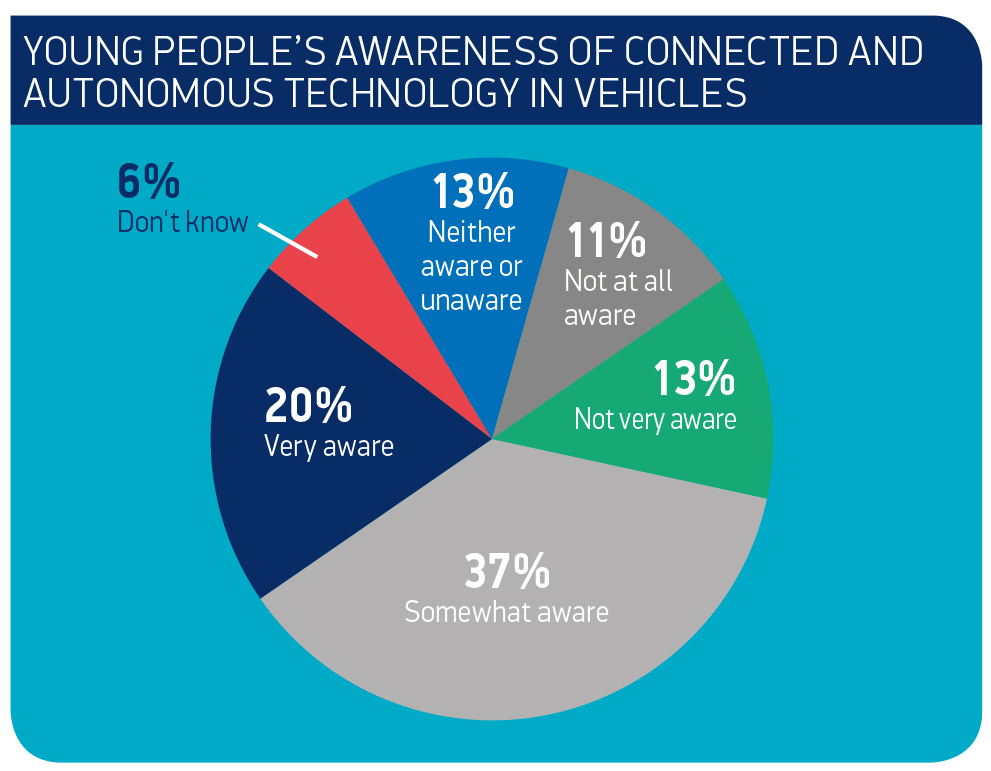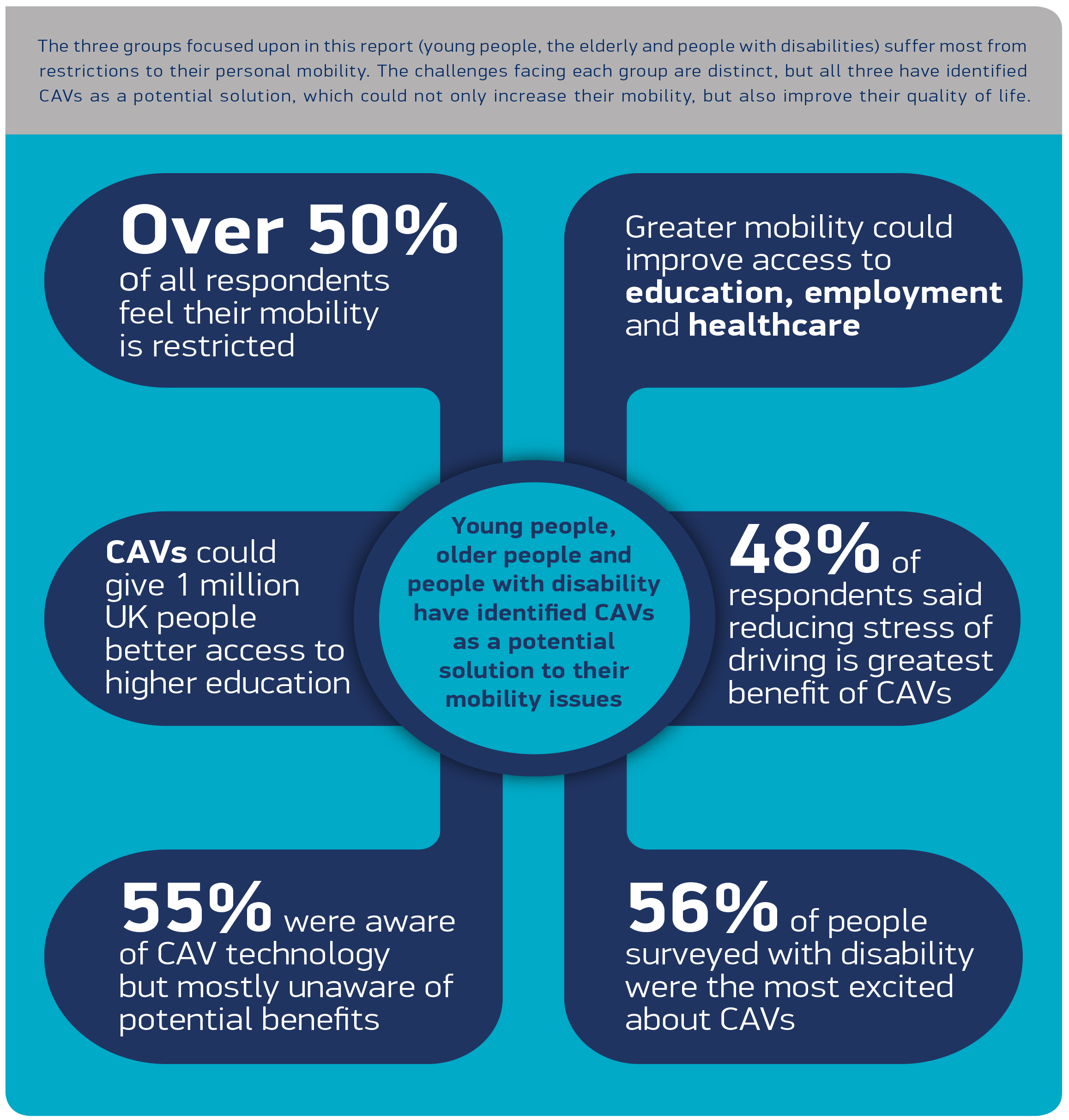- 71% of young people say connected and autonomous cars will improve their lives and give them greater freedom, finds new study.
- Next generation of car buyers leads CAV charge, with half of 17-24 year olds saying they’d use a self-driving car today.
- Stress-free driving seen as the biggest benefit, with cars that brake and park themselves and in-car entertainment top attractions.
Connected and autonomous vehicles (CAVs) will transform the lives of more than seven out of 10 young people, according to new research published by SMMT. Connected and Autonomous Vehicles: Revolutionising Mobility in Society,1 the first UK-based study of the human impact of CAVs, canvassed the views of more than 3,600 consumers and found that this new technology will offer unprecedented levels of freedom to young people whose lives are currently restricted by costly or infrequent public transport, or prohibitively expensive car insurance.
The research, conducted with Strategy&, PwC’s strategy consulting arm, shows CAVs have the potential to significantly reduce social exclusion. 71% of survey respondents aged between 17 and 24 said this new technology would improve their quality of life. Meanwhile, 69% said they feel positive about CAVs, with almost half (49%) saying they would get in one today if they could.
Automatic braking and parking and the car’s ability to self-diagnose faults were cited as key attractions of CAVs, contributing to a reduction in driving stress – the biggest attraction of owning a CAV among this group. Meanwhile connected entertainment features such as music and video streaming were also appealing. Freedom to travel spontaneously and socialise with friends and family were also seen as life-changing benefits, with 88% of people who believe CAVs will improve their social life saying a CAV would help them get out of the house more regularly.
Mobility is a challenge for many young people, with more than a quarter (29%) saying the cost of car ownership, particularly high insurance premiums, restricts their freedom. They also cited the high cost and infrequency of public transport as a barrier. The potential for saving money, therefore, was highlighted as a key benefit of connected and autonomous vehicles.
Other advantages included the ability to access further education such as A-Levels, a degree or a post-graduate qualification, while 15% said they believe CAVs will provide greater employment choices. In fact, Strategy& calculates that CAVs have the potential to give one million more people access to higher education, enabling them to increase their earning potential by an estimated average of £8,509 per year.
Mike Hawes, SMMT Chief Executive, said,
The benefits of connected and autonomous vehicles are life-changing, offering more people greater independence, freedom to socialise, work and earn more, and access services more easily. While fully autonomous cars will be a step change for society, this report shows young people are already tuning into their benefits – and it’s great to see tomorrow’s new car buyers getting excited about the vehicles they’ll be driving in the future. The challenge now is to meet this excitement by creating policy to allow this technology to thrive, given how it will deliver these wider societal advantages.
Mark Couttie, Strategy& partner, said,
There is a real risk that this momentum and competitor advantage in the UK will stall if we don’t do more to create positive public perception, overcoming our inherent risk averse culture. Expanding people’s horizons about the advantages of fully autonomous cars is a vital first step. This means better communicating the art of the possible to increase social acceptance and dispel concerns that our survey identified relating to cost and safety. Significant investment must also be made to improve the connectivity infrastructure across the UK road network and this report provides a number of clear recommendations to ensure that we capitalise on this window of opportunity.
Although fully connected and autonomous vehicles aren’t expected to become mainstream until 2030, most new cars are now connected via sat nav or Bluetooth, and more than half are available with safety systems such as collision warning or autonomous emergency braking. The UK is also fast establishing itself as a centre of excellence for this exciting new technology, with billions of pounds of investment already delivering public trials of autonomous driving and testing of prototype vehicles by car makers on UK roads.
SMMT has already identified a £51 billion economic opportunity to the UK, as well as the potential prevent some 25,000 road accidents and save 2,500 lives.2 This new research suggests that the potential of CAVs to get more people into education or work, and enabling them to more freely access healthcare, amenities and leisure activities, could deliver a further economic boost.
Notes
1 Connected and Autonomous Vehicles: Revolutionising Mobility in Society, March 2017, Strategy&, includes findings from a survey of 3,641 UK consumers aged between 17 and 65+ conducted between 2 and 17 March 2017. The sample included 1,000+ respondents in each of the demographics: people aged 17-24, people aged 65+, and adults aged 17 and above with disabilities.
2 Connected and Autonomous Vehicles – The UK Economic Opportunity, March 2015, KPMG










